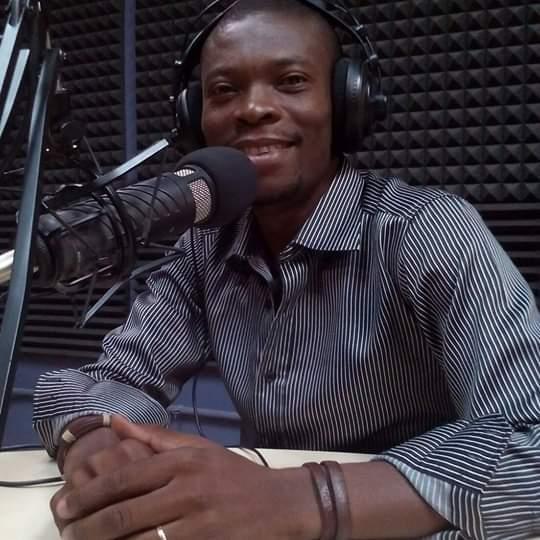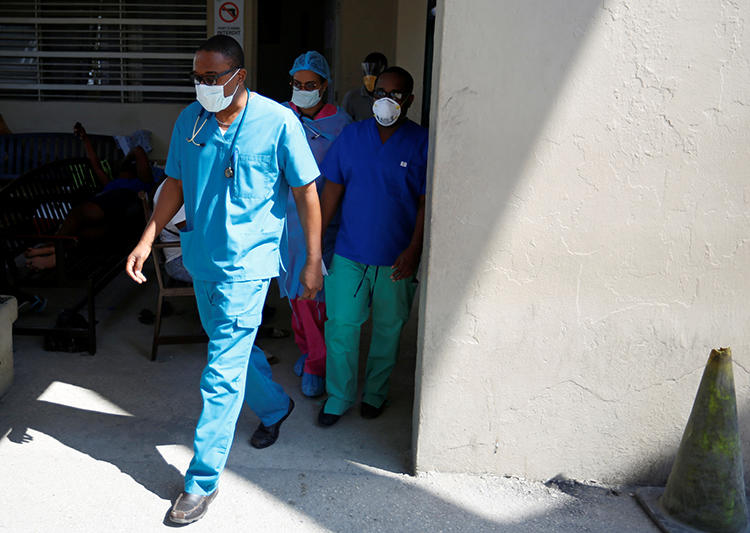Reuters correspondent Robenson Sanon has been covering life in his home country of Haiti for over 10 years.
He has covered natural disasters, social unrest, and issues affecting daily life in the country. Last year, he was shot and wounded in the capital, Port-au-Prince, while covering protests calling for the resignation of President Jovenel Moïse, as CPJ documented at the time.
But now, he is facing a new challenge: while the World Health Organization only reports 24 confirmed cases in Haiti as of April 7, the pandemic has made preexisting issues such as government mismanagement and dangerous reporting conditions even worse.
Sanon, who is based in Port au Prince, spoke with CPJ over the phone on March 19. His replies have been edited for length and clarity.
What is the reporting environment like for covering the pandemic?
In Haiti, information is not guaranteed. You have to fight to access information. It is truly difficult to get information from the government. Sometimes it will take me two to three weeks for a single piece of reporting. You call a government institution to ask for information and they tell you to ask for an appointment.
Presently, we depend on what authorities tell us. They say there are 10 confirmed cases of coronavirus, but there is no way to verify that information. We really do not know what is happening. We are limited to whatever information they provide us.
We are living in a country under a very precarious situation. My reporting is focused on social topics that are related to the pandemic, for example, access to clean water to drink and to wash your hands, which is fundamental in the midst of a pandemic.
I recently did some reporting on this topic from an encampment of homeless people, located near Delmas 2 [a commune in Port-au-Prince], where people with disabilities live. These are people whose homes were ravaged by the hurricane who had preexisting disabilities or who became disabled after the earthquake. These people need to find water. With my reporting, I try to call attention of public authorities and public opinion to their situation.
There are people that live in remote areas, they don’t have access to hospitals, so I give them a space to use their voices, for them to express themselves.

What are the greatest obstacles for your coverage?
The greatest challenge is having access to reliable information. The other challenge is making sure that you are working under safe conditions and without getting infected, because if I do, where am I going to get treated if our hospitals are not equipped to face this? That is the biggest concern.
Working as a journalist in Haiti is truly a challenge, considering that this is a country in a very difficult situation. For example, access to the internet is not guaranteed. Sometimes it takes me one or two days just to send a reporting piece over the internet to Reuters.
What are you doing to keep yourself safe?
At present, in Haiti there is no safety equipment for journalists to work without risking their lives. All I have are masks and gloves, and that’s it. The places we visit are probably contaminated. You are exposed to the virus, as is everyone else in a press conference. This situation makes you ask yourself thousands of questions, about whether it is safe to keep doing this job. And your loved ones ask you ‘what are you doing there?’
If something happens to you, if you get sick, no one will be able to help you. One tries to take all the precautions, but there is a limit to what you can do on your part.
I keep social distance, and I wear the masks and gloves. Many of my colleagues don’t have protective equipment. And like soldiers in the battlefield, we are in the first line of battle.
How are you dealing with and responding to misinformation around the virus?
In the current context, I do not have a source that can give me any reliable information, because all of the information is in the hands of the government. There are very few people that handle this information. The rest are just rumors. Up to this point, we depend solely on government press conferences. As journalists, we always try to find a balance, to corroborate the official information. But in these circumstances, it is really difficult.
Haiti is still an open country, we are still receiving flights from the United States. If there is a suspected case of someone with COVID-19, they have to send the specimen to the national lab, and wait for days to get the results. There is no way to do a quick test. So, there is very little information. Nobody knows anything, apart from what the government says. We really have no other source of information. We don’t really have sources to have a minimum of corroboration of official information.
[Misinformation] is the fight, the biggest fight. Lack of access to information is conducive to the spread of misinformation. Today, there are people on radio and television who offer drugs or treatment solutions for the coronavirus which have no scientific basis.
As journalists what we do is that we support each other, we reproduce each other’s messages, letting the public know that information provided was false, and that way we have a stronger impact. That’s how we operate in this fight, as a network.
I personally always take care to verify the information with an authorized spokesperson or member of the government. We are fighting a real fight. I am constantly monitoring radio and television stations, and informing the public when there is misinformation.
In Haiti, there is no authority tasked with fighting misinformation. Sometimes, a member of government will provide a statement saying that some content that is circulating is false. But this is not a sustained or structured fight.
Do you think Haitian authorities are seriously investigating threats against journalists?
I want to be completely honest: I do my work in an environment of fear. Journalists work in Haiti under truly difficult circumstances.
When you are attacked, you want to file a complaint, but against whom? There are systematic attacks, sometimes from the police, and there is no protection. When I am reporting in the streets, my biggest concern is taking out my camera, because of the insecurity. And then there are the gangs, which operate with impunity throughout the country. You have to fight constantly to protect your own skin.
When I was injured last year, the news was covered throughout the world. But, I never received a single phone call or communication from government or justice officials about an investigation to determine the facts of the incident. Not a single one. And then, this past February, on the 13th, someone broke into my home and stole my working equipment, including my laptop and phones. I filed a complaint before the police. Again, I have not received any communications about the investigation.
Professional safety is not guaranteed in Haiti. So, I am constantly asking myself questions about my safety and the future of my family. This is the hardest thing of all. Also, gangs are becoming increasingly powerful.
I think of the case of my colleague Vladjimir [Legagneur], where there are no results from the investigations into his disappearance. You never know how things will end, and so there are journalists who have decided to flee the country. But that is the job we do.
I am constantly asking myself questions about my job, and the risks I take. But I love my job.
